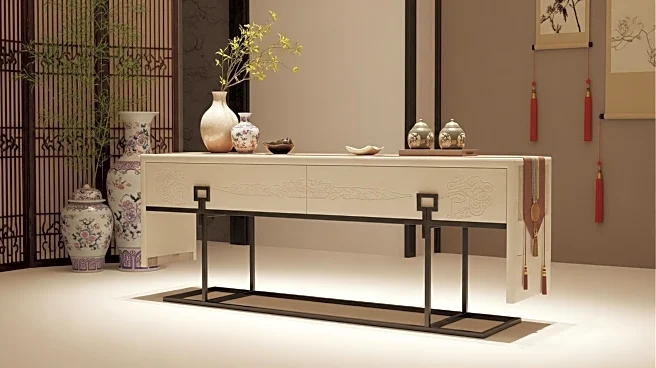What's Happening?
Yabu Pushelberg, a design studio based in New York and Toronto, is enhancing its involvement in China through a collaboration with HC28 Maison, a high-end furniture brand based in Beijing. Founded by Glenn Pushelberg and George Yabu in 1980, the studio is unveiling nine new creations at the China International Furniture Fair in Shanghai. These designs, part of the HC28 Cosmo line, include the geometric Shu lounge chair, Junnuo dining table, Jin series of coffee tables, and Suyan credenza. The collaboration aims to blend Yabu Pushelberg's modernist style with HC28's contemporary Chinese design vision. The studio has been active in China for over 30 years, observing a shift in the region's design conversation towards leading from within.
Why It's Important?
This collaboration signifies a growing trend in the Chinese luxury furniture market, which is experiencing a resurgence due to advancements in smart home technologies and a renewed interest in traditional craftsmanship. By partnering with HC28 Maison, Yabu Pushelberg is tapping into this evolving market, which is increasingly appealing to a new generation of consumers. The partnership highlights the potential for international design studios to contribute to and benefit from China's burgeoning domestic luxury furniture industry. This development could lead to increased global recognition for Chinese design and further collaborations between international and Chinese brands.
What's Next?
Yabu Pushelberg's collaboration with HC28 Maison is expected to strengthen its presence in China and potentially lead to more partnerships with other Chinese brands. The studio's involvement in the region may inspire other international designers to explore opportunities in the Chinese market. As HC28 Maison continues to expand its distribution network globally, the collaboration could enhance the brand's international profile and influence the global luxury furniture industry.
Beyond the Headlines
The collaboration between Yabu Pushelberg and HC28 Maison reflects broader cultural and economic shifts in China, where there is a growing emphasis on national pride and traditional craftsmanship. This partnership could contribute to a deeper appreciation of Chinese design on the global stage, fostering cross-cultural exchanges and innovation in the furniture industry.











